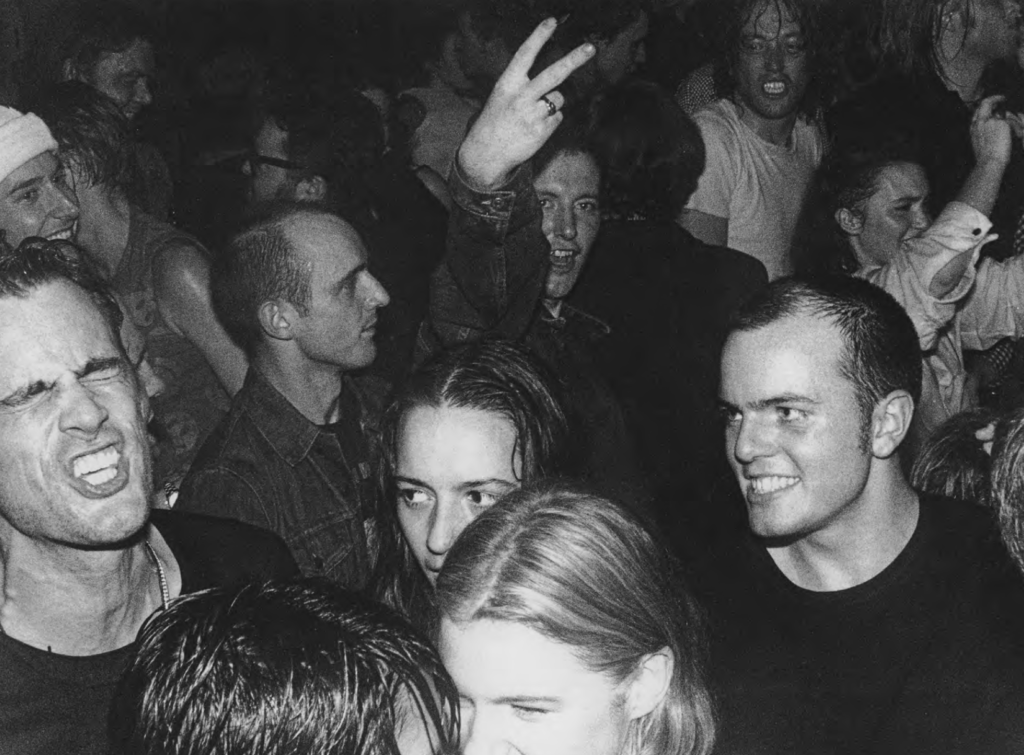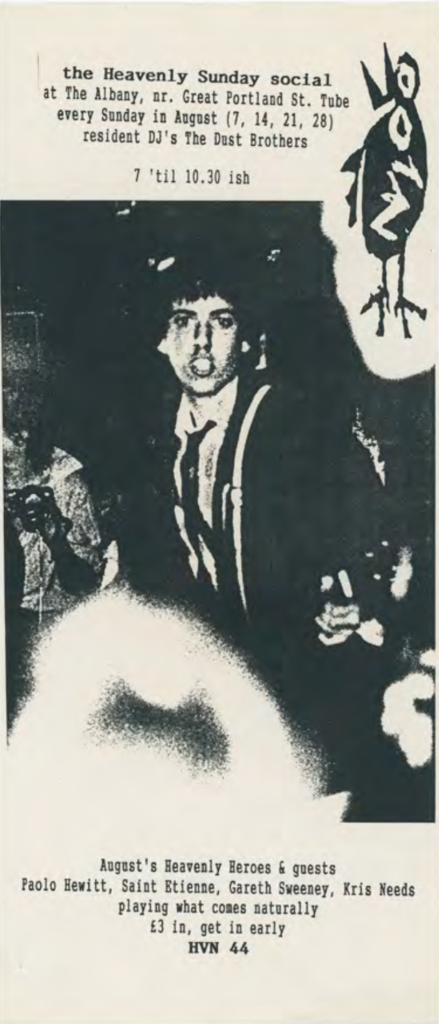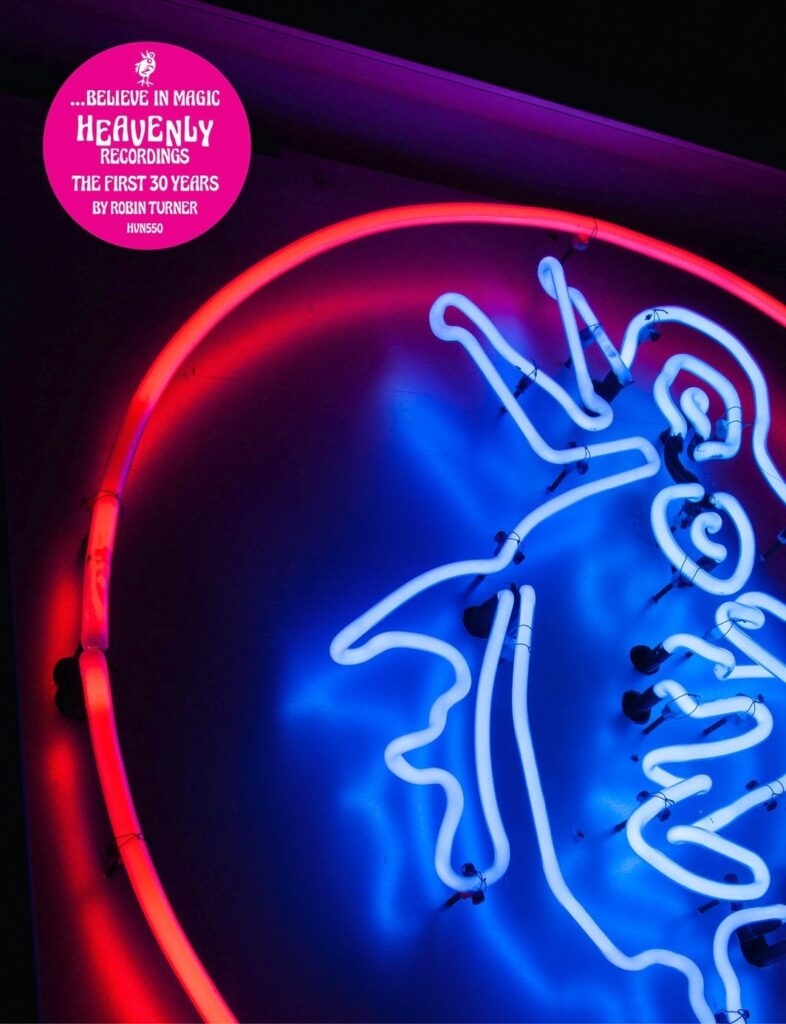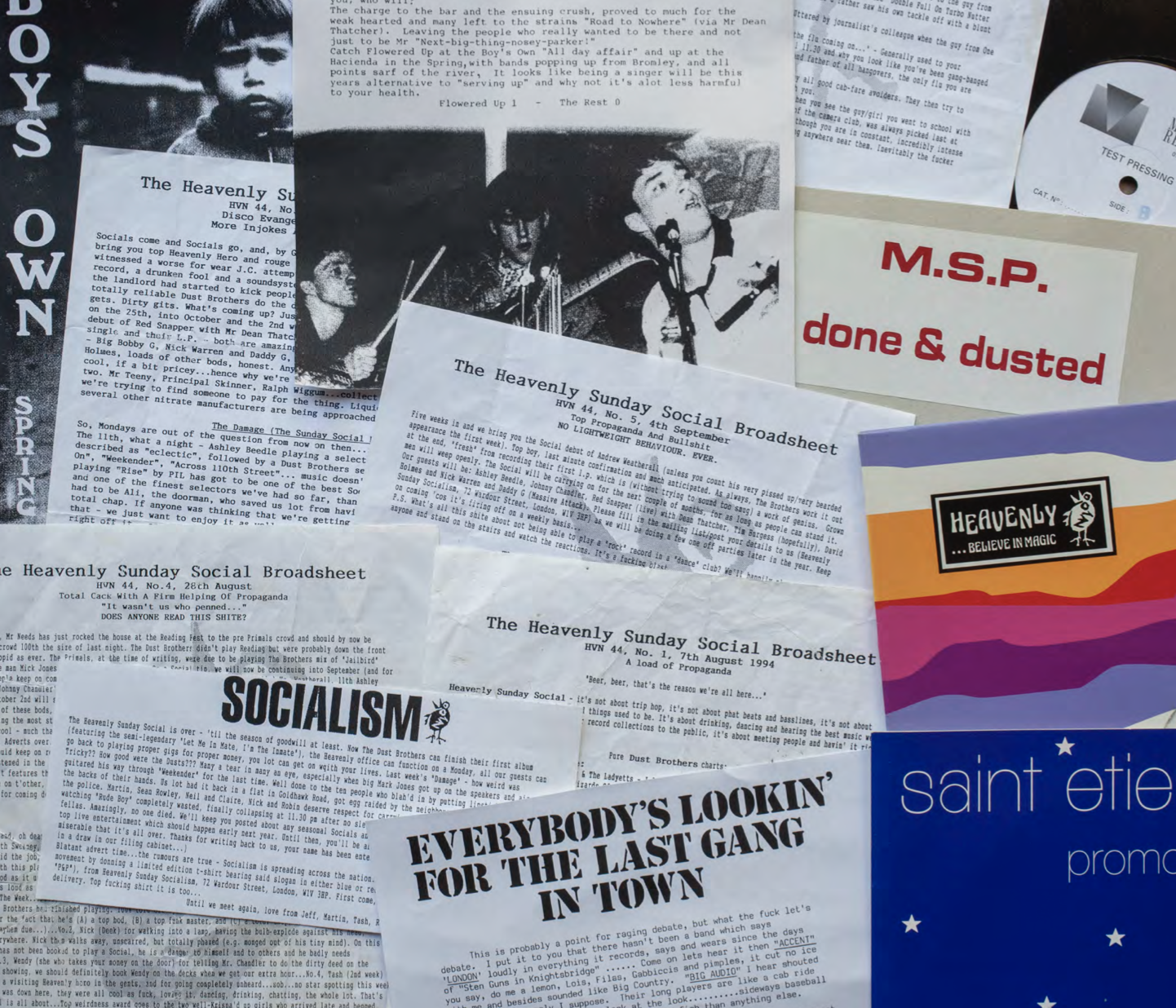Yesterday saw the publication of Robin Turner’s book …Believe In Magic: the First 30 Years of Heavenly Recordings. As you probably know, our bricks and mortar home The Social was set up by the people behind Heavenly Recordings. And, as you probably also know, that venue was an attempt to build a permanent home for the spirit of our club nights, which had begun in August 1994 at the top of Great Portland Street. Below is an extract from the book about the night that inspired it all – The Heavenly Sunday Social. As Nick Dewey says: ” It was like the sleeve of The Pogues album Rum, Sodomy & the Lash. Everyone clinging on for dear life.”
The Heavenly Sunday Social took place in the most unassuming of London venues – the basement room of a pre-furbished pub somewhere between the West End and the rest of the world. The resident DJs, Ed Simons and Tom Rowlands, are now world famous as The Chemical Brothers. Back then they were The Dust Brothers. Three singles into their career and living on borrowed time name-wise after the original owners asked for it back, Tom and Ed were recording their debut Exit Planet Dust at the time the club began its thirteen-week run.
During those weeks, The Dust Brothers exploded. They were the main attraction. Their supporting cast included many of their peers, people like Andrew Weatherall, Justin Robertson, Tim Burgess and David Holmes, all of whom were happy to play second fiddle to the crazed block party the headliners would throw down until the lights went up.
The idea for the Sunday Social came after hearing The Dust Brothers DJ week after week in the back rooms of clubs and at house parties. They played like their lives depended on it and the music was wildly exciting. Sets would hammer hip-hop instrumentals into tweaking acid house, gleaming techno and psychedelic rock ’n’ roll. We weren’t club runners, we were a record company and a press office that had a pretty good idea about what a party should feel like. (RT)
Voices:
Jeff Barrett – Heavenly Recordings
Robin Turner – Heavenly Recordings
Martin Kelly – Heavenly Recordings
Ed Simons – The Dust Brothers (then)/The Chemical Brothers (now)
Wendy Barrett – Jeff’s wife, door person at the Heavenly Sunday Social
Pete Wiggs – regular and guest DJ, Saint Etienne
James Dean Bradfield – regular, Manic Street Preachers
Beth Orton – regular, solo artist
Nick Dewey – regular, now co-manager, The Chemical Brothers
Sarah Cracknell – regular, Saint Etienne
Chloe Walsh – regular, press officer at Heavenly
Sean Rowley – regular, TV producer (then)/DJ, broadcaster and club runner (now)
*
Jeff Barrett: I remember Robin coming into the office shortly after he started working there raving about hearing The Dust Brothers DJing somewhere. Possibly in Manchester. I knew who they were because Robert Linney [former Heavenly accountant] had just started managing them out of the office.
Robin Turner: It was actually hearing Tom and Ed playing the Job Club at Gossip’s on Dean Street around the end of ’93/start of ’94 that made me start thinking about starting a club night. They’d left Manchester by then. I used to go down there a lot when they were playing. They’d be doing a little alcove there, the equivalent of the third room. I was twenty-three and up for it – doing press for Underworld opened a few doors at clubs that had always been banged shut in my face before. Tom and Ed were the same age as me and they had loads of the same musical references. We got on and they had a really great set of mad mates who used to go to all of their DJ gigs. In the spring of 1994 they did the back room of a venue on Kensington High Street called the Park: Boy George and Danny Rampling in the main room, Tom and Ed making a racket in the back. There was a sofa on the edge of the dancefloor and I remember Tom’s girlfriend (now wife) Vanessa and his brother Huw diving off the speaker stack face-first onto the sofa to some mad acid record. It felt like a vibe, and a really funny one too. And it felt like something we should try to do as our own club.
Martin: At the end of March, Saint Etienne played the first ever show at Shepherd’s Bush Empire. We’d all been expecting a late-night bar, but we got kicked out, so we all piled back to Jeff’s old flat round the corner in Cromwell Grove. Tom and Ed were part of the gang that came with us. Back there, Jeff was playing a load of records like ‘Across 110th Street’ by Bobby Womack and ‘Under the Influence of Love’ by Love Unlimited.
Jeff: We were all smashed, lying on the floor with our heads between the speakers. I’d be putting on records and Tom and Ed were going, ‘What the hell is that?’ It was those records Martin mentioned and then things like ‘Time’s Up’ by O.C., hip-hop records I’d picked up in Soho. And from there, the idea of repeating that kind of night but as a club seemed to make a bit more sense.
Ed Simons: We were really excited to have people to hang out with in London. One of the things that really inspired us all to do the club was that impromptu party back at Jeff’s after a Saint Etienne gig. We all bonded over a load of brilliant records he was playing and the relationship kind of grew from there.
Robin: Martin had the idea to look at The Albany on Great Portland Street. It had a broken clock on the wall and sticky carpets and an Aussie landlord who thought we were taking the piss when we said we thought we’d get fifty people in on a Sunday night. I tried to come up with a name that had a kind of ‘pop’ feel to it. Clubs were called things like Gosh! and Déjà Vu and Strut. Jeff came up with The Heavenly Sunday Social, which felt utilitarian, functional; it was odd and felt like something that might go on in a miner’s institute in the Valleys. It was the perfect name for what it was, a projection of what you wanted a club to be. The flyers were strips cut from an A4 sheet photocopied; they were as basic as you could get away with without scrawling ‘NEW CLUB PLS COME THREE QUID IN’ on a piece of bog roll.

Wendy Barrett: I thought the idea of a weekly get-together where you could hear great music was perfect. We all thought that it would be pretty low-key. We had no idea it would go so crazy.
Martin: The first week I couldn’t be there the whole night as Tash from the office was promoting a gig up the road with Dan Penn and Spooner Oldham. I got there later on and it had kicked off.
Ed: The first one was pretty quiet. There were maybe fifty people, mostly people that we knew. The second week, Bob and Pete played, and it was roadblocked. The third week I remember I had a big night and I had to pull myself together to get down there. I ended up arriving pretty late and there was a queue right around the pub, people desperate to get in. It was a pretty easy club to pack. It wasn’t that big but seeing that felt pretty amazing. We put together a set of records that we stuck quite closely to every week – the kind of hodgepodge of instrumental hip-hop and rare-groove bits that we picked up in Eastern Bloc in Manchester off Richard Moonboots. We were playing pretty mad records, stuff like ‘Dead Homiez’ by Supersuckers, heavy acid stuff like ‘Lobotomie’ by Emmanuelle Top, Sly & Robbie’s ‘Boops’, The Beatles’ ‘Tomorrow Never Knows’, as well as load of our own stuff. We were pretty proud of the music we were playing, it was completely different to everything else out there. We started pretty much every week with ‘Strange Games and Things’ by Love Unlimited Orchestra, a really strange slow-burn instrumental disco track that never quite peaks. It ended up being like a weekly call to arms.
Martin: Once Tom and Ed started, you’d look around the room and the look on people’s faces was pure elation. I guess it’s like what people say the really early days of acid house were like – a communal spirit. You definitely had that feeling that you were doing something that other people didn’t know about yet, something special, something illicit. I remember having that feeling at Shoom – you knew the outside world was unaware that you had a secret that you wanted everyone else to know, but at the same time you weren’t going to be the one to tell anybody, cos then it would be out. The actual club ended up being very close to the ideas we’d had initially. None of us could have predicted how it was going to pan out, but in terms of the way it was envisaged, as a place where likeminded people could hang out and drink and hear great music, that’s pretty much how it was.
James Dean Bradfield: We’d just finished mixing The Holy Bible. And I’d just moved up to London out from my parents’ house for the first time. I was feeling burnt and a bit lonely. I was drinking in a pub on Westbourne Grove on my own one night when I bumped into a drunk Pete Wiggs and Robin Turner. They would be crapping on about some guys called The Dust Brothers playing down this club they were involved in. Meeting them was kind of like reconnecting with my past with Heavenly. I remember being there and thinking that ‘Chemical Beats’ was the best thing I’d heard since AmeriKKKa’s Most Wanted or Fear of a Black Planet. Also ‘Under the Influence of Love’ by Love Unlimited. I’d never heard a record like that played at that volume. It made me think that they were trying to rock ’n’ roll-ise everything, which I thought was brilliant. Also, it was on a Sunday. Sunday is always a good piss-up day.
Beth Orton: I definitely got caught dancing on the bar at the Albany a few times. Nobody really cared though; no one was going to kick you out. For any reason.
Nick Dewey: At the Albany there was a clock on the wall downstairs, permanently stuck at five to twelve. It was on the wall behind where the decks were, and there wasn’t anything else to look at in terms of visuals. So that was the focal point. It seemed to be symbolic of something really important even though no one had a damn clue what that might be.
Pete: One of many reasons why the Social was great was because there wasn’t any of the usual crap you got at clubs. There was no guest list, there wasn’t any door policy; it was egalitarian. It did mean it was horribly packed . . . no one really cared as long as they were inside. I remember when I played records down there with Bob, I’d only just started DJing around that time. It was a fairly wayward set, but people were asking what things were, there was no heckling. We were made to feel very welcome – it was great to be playing stuff that wasn’t house music and not get some idiot having a go at you.
Robin: I remember one week finding myself at the bar stood next to Paul Weller. There was a polo-shirted, modish looking guy stood next to him clearly in awe. He blurted out, ‘Mate, All Mod Cons made me the man I am today!’ Without missing a beat Weller looked him up and down and said with disdain, ‘And that’s supposed to make me proud?’ I pissed myself and immediately asked him what he was drinking. The answer, obviously, was Löwenbraü.
Sarah Cracknell: I remember having my arse pinched by Paul Weller as I was walking up the stairs at the Albany. It was very funny to turn round and see who’d done it, a massive cheeky grin on his face.
Martin: I really remember records like ‘Live Forever’ and ‘Weekender’ standing out. Tom and Ed played them alongside their own records and those were the points where you’d really stop and go, ‘Fuck’. I remember someone coming up to me and going, ‘What the fuck is this?’ It was ‘Tomorrow Never Knows’. They were convinced it was some remix. It was the original, played off the original vinyl, just out of its normal context. Tom and Ed had the ability to make all those records meld together. That was their secret.
Ed: Playing down there was always very intense. There was no booth and the decks were on a table. You knew that if it had been a sunny day, it would get a bit rowdy. The decks would jump all over the place. It was a total pain in the arse.
Nick: Every week, Tom and Ed would come straight from the studio clutching some new classic to try out alongside all those great remixes they were making at the time. They’d play all of these mad hip-hop instrumentals, psychedelic rock tracks and stuff like the Leftfield remix of Renegade Soundwave. It got heavier and more intense as the set went on. It was more like a rock ’n’ roll show in the way exploded from one track to the next, but totally unlike any band you’d ever seen. I just remember thinking that was the best music. That it was the music I’d been waiting to hear all my life.
Sean Rowley: Things did take a turn for the worse for me after a few weeks going to the Sunday Social. I was working on The Big Breakfast at the time so I needed to up and about very early on a Monday. The nights themselves were getting more and more sprawling and pretty soon I was missing from work on Mondays. I went through a succession of lies such as, ‘I went out this weekend and I got spiked. It’s put me off acid for life.’ After a few weeks, Tuesdays started to disappear, then Wednesdays. After a while of not turning up, I got confronted by the head of the production company Planet 24 on a Thursday morning. Without thinking it through, I said, ‘I was out on Sunday, jogging, when I got run over and I’ve been in a coma for forty-eight hours. I’ve had a scan and I’m all right now.’ I was pretty sure I wasn’t going to last too much longer at The Big Breakfast.

Nick: I threw myself in with both feet. You had to, really, it was all or nothing. It wasn’t the sort of place you could stand at the bar trying to look cool. Once you were in, you were in, and there was no escape. You went to the toilet at the start of the night as there was no way you’d get all the way over the other side of the room when it was in full swing. I’ve been back to the Albany since and it’s only about two feet from one side of the basement to the other, so they must have really packed them in. There wasn’t really a dancefloor – more, it was more like a pile-on. It was a bit like when you play football at primary school and you form a big swarm that moves around the pitch with no proper passing, or tackling, just everyone hacking away at the ball. It wasn’t really dancing by the end of the night; it was more like the sleeve of The Pogues album Rum, Sodomy & the Lash. Everyone clinging on for dear life. And the heat was unbelievable. You’d be soaked to the skin by the time you stepped outside at the end. I can’t imagine anything worse now but, at the time, I loved every single second of it.
Chloe: I went to almost all of them, but I can only remember about ten minutes of any of them – ten minutes total, not ten consecutive minutes. My memory is murky, as was the club. It was rowdy and sweaty and frenzied. I first laid eyes on a lot of people who would soon become some of the very best friends I’ve ever had. All of them red-faced, covered in sweat, splashing beer all over themselves as they pogoed on top of tables.
Sean: The club always got tagged as eclectic, which missed the point. It was far more focused than that word implies. I’m obviously not a snob, but I did get very protective of it. Very much, ‘If you don’t get it just fuck off.’ The anything-goes philosophy got very misinterpreted. Not within that night, more with the kind of clubs that came after and what the Social got lumped in with. There were great, life-affirming moments in the warm-ups that really did have that magical ‘all back to mine’ feel. You could play a northern record next to an acid record next to God knows what. What was really special was that each warm-up DJ had a different take on things. Even if it didn’t quite work, you didn’t really mind that you’d got there early because you knew you were about to be delivered the goods by Tom and Ed. The guests really were like support bands. Some were fantastic, some weren’t quite right. No one cared. You got there early and hung in there.
Ed: At that point, it was amazing for us to be playing with the likes of Andrew Weatherall, Ashley Beedle and Justin Robertson, people whose names we’d read in magazines. Suddenly they’re warming up for us. Andrew played an incredible set that was put together so brilliantly, completely differently to how he would have done it his own clubs. Jeff’s set was inspirational too. He played some fantastic records – mad Italian disco house records you’d forgotten about, and then things like Sister Sledge, ‘Thinking of You’.
Pete: There were times when I’d pray for a night off, but I was petrified that someone would come and knock on the door and drag me down. So I’d usually just head down there before that happened. It was pretty addictive once you started going.
Robin: Every week you kept hearing these mad stories of things people had done down there. Some guy leching over girls was set on fire with a bottle of amyl and a lit cigarette. Someone chucked a pint over him to put him out. Then there was a guy getting a blowjob on a pile of coats behind the decks. I’m not sure if it was the smell of the place or the fact that it was so packed to the bloody rafters, but the one thing that place wasn’t was sexy. Call me old fashioned, but I’m not really sure how that one happened.
Wendy: Sunday night back then was early closing, but no one was ready to go home at half-ten. Sometimes we carried on at home, pissing the neighbours off.
Martin: The Social couldn’t really have gone on much longer at the Albany. I think we – Heavenly and Tom and Ed – were all very aware that it needed to stop. It was getting out of hand numbers-wise. On the last night, Brian, the landlord, estimated there was 1600 people either inside the building or outside trying to get in. The capacity of the place was about 160, comfortably. We usually got 300 in somehow. That last night, Brian was stood on the bar taking a panoramic photo of all the people locked out, probably to tell the brewery this was just another average Sunday night for him down the pub.
James: If the Sunday Social were happening now, it would definitely kill me, and I wasn’t even taking drugs.
Sean: One of the great gifts that life can bestow on you is to actually have, for a brief moment, a place where you can go and literally lose yourself. I was lucky enough to have that for that period of time at the Social. I’d never in a million years dream of going back, but I wouldn’t swap the experience for anything.
Ed: 1994 was one of those great summers – an amazing time for us. It was the first time we’d had our own club. We were making Exit Planet Dust on the weekdays and DJing every weekend. And it was one of those rare, really hot summers – well, rare back then. The best thing about it all, at the end of the day, was that the people I met at the Social are people I’ve been friends with now for twenty-five years.
Robin: While it was going, we knew the Heavenly Sunday Social was vital and important and different, but we also knew that it had to stop when it did. None of us really wanted to be club runners, and charging three quid on the door wasn’t ever going to make us rich. The one money-spinning idea we did have was selling a t-shirt with SOCIALISM printed in bold on the front at the last Albany party. We obviously left the box outside the pub on the last night. Those fifty-odd shirts either ended up as landfill or as fashionable undergarments for local rough sleepers.
Taken from ’…believe in Magic: Heavenly Recordings, the first thirty years’ written by Robin Turner, designed by Paul Kelly and published TODAY by White Rabbit Books!


